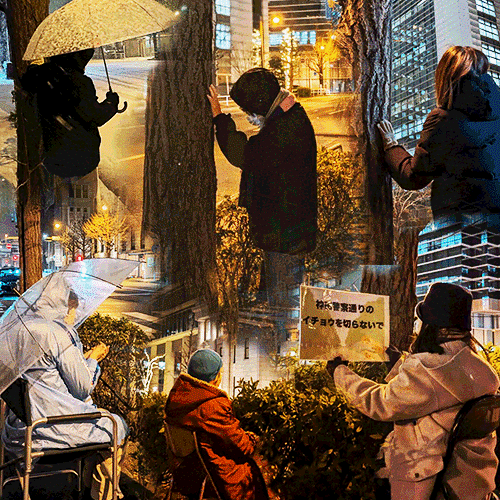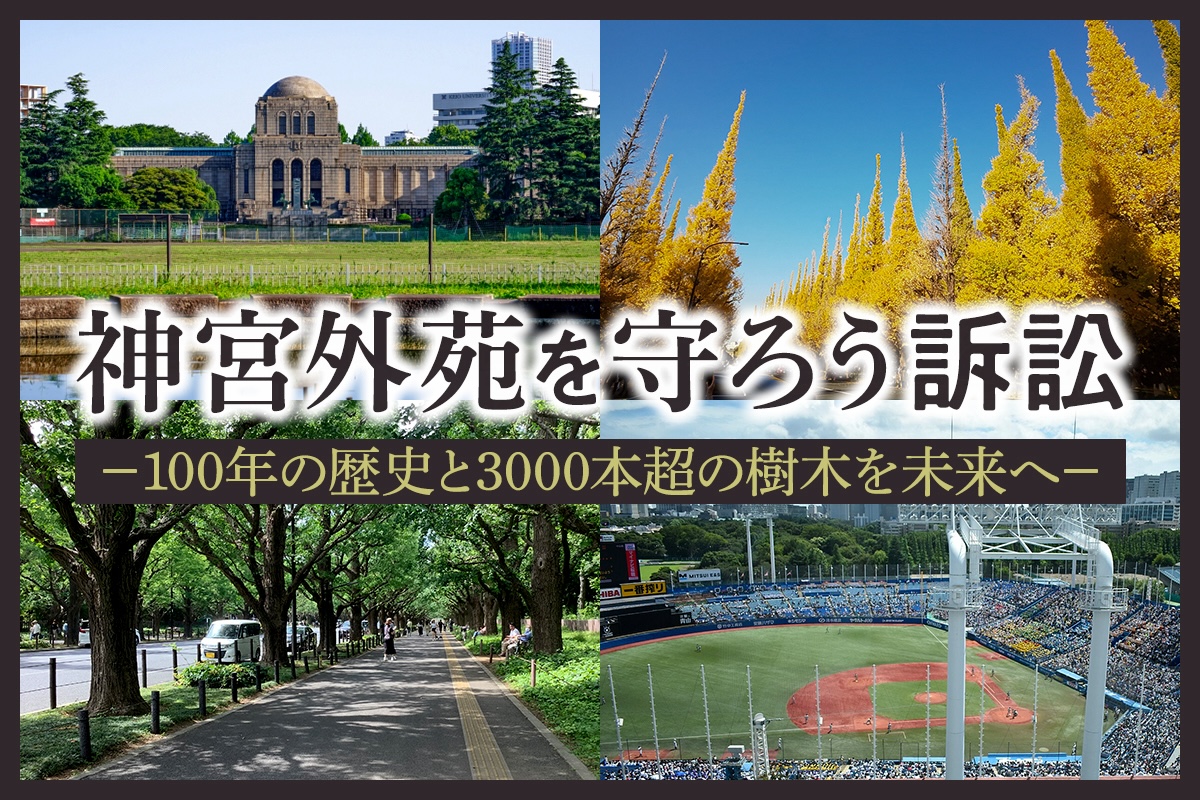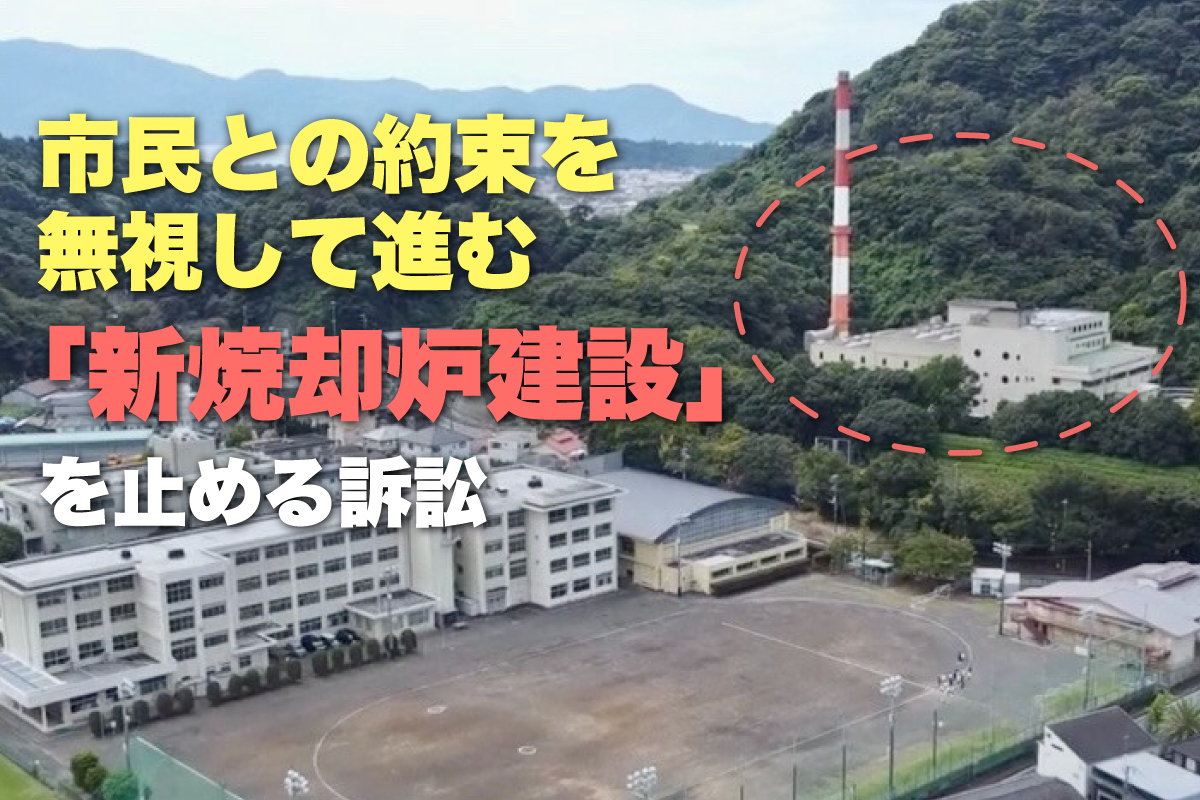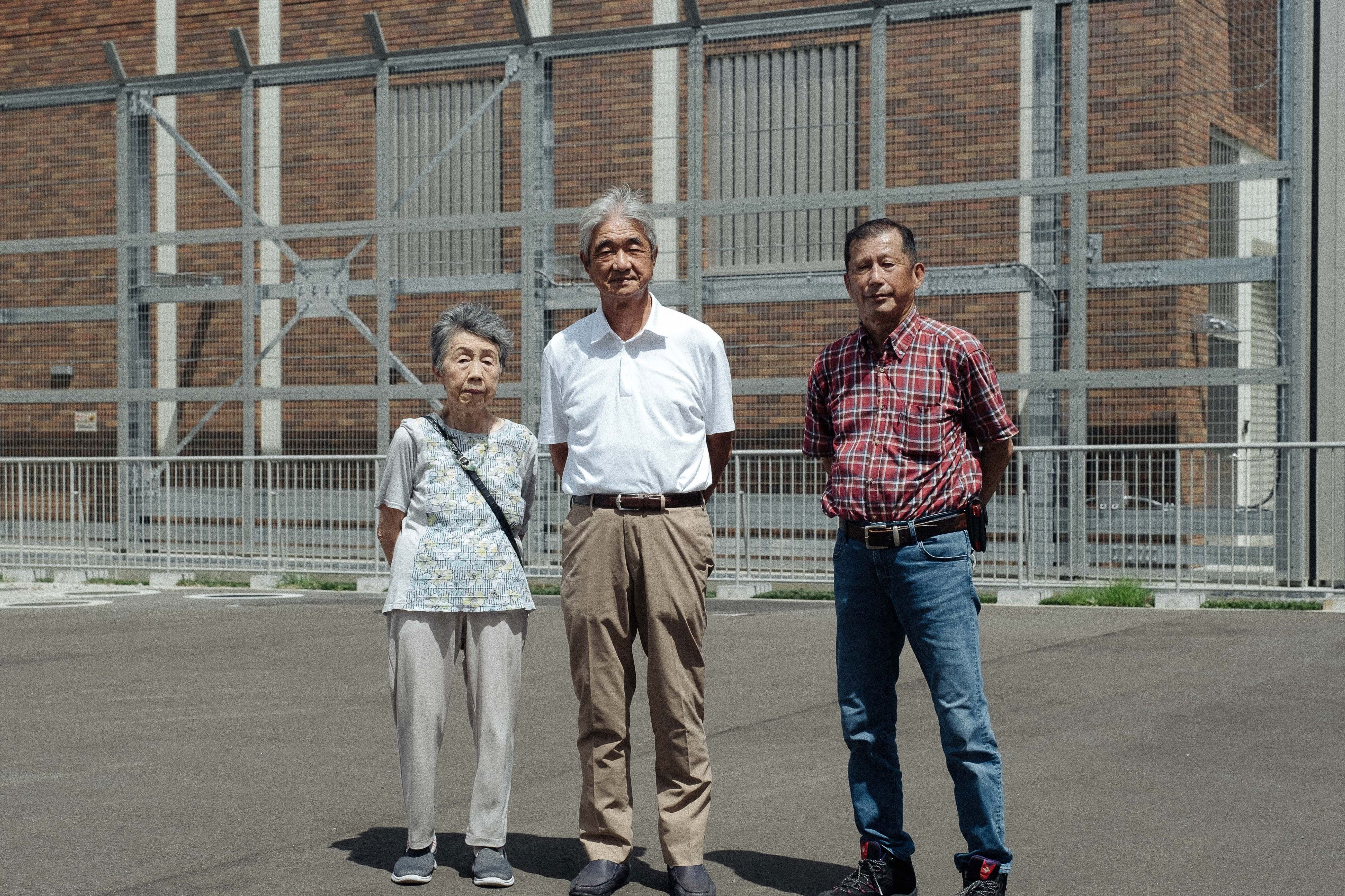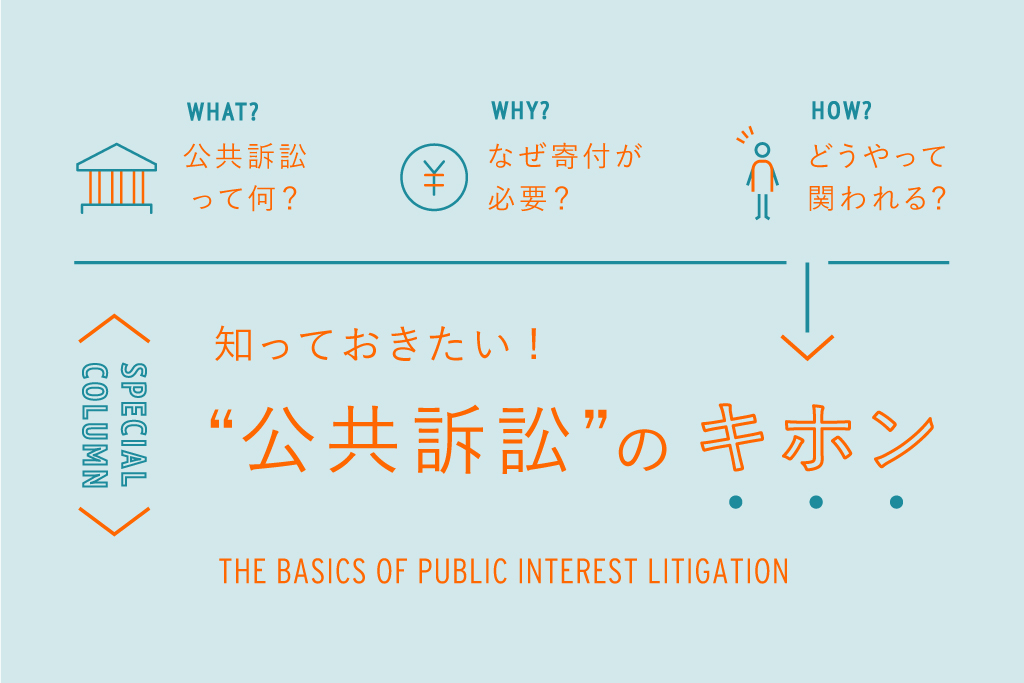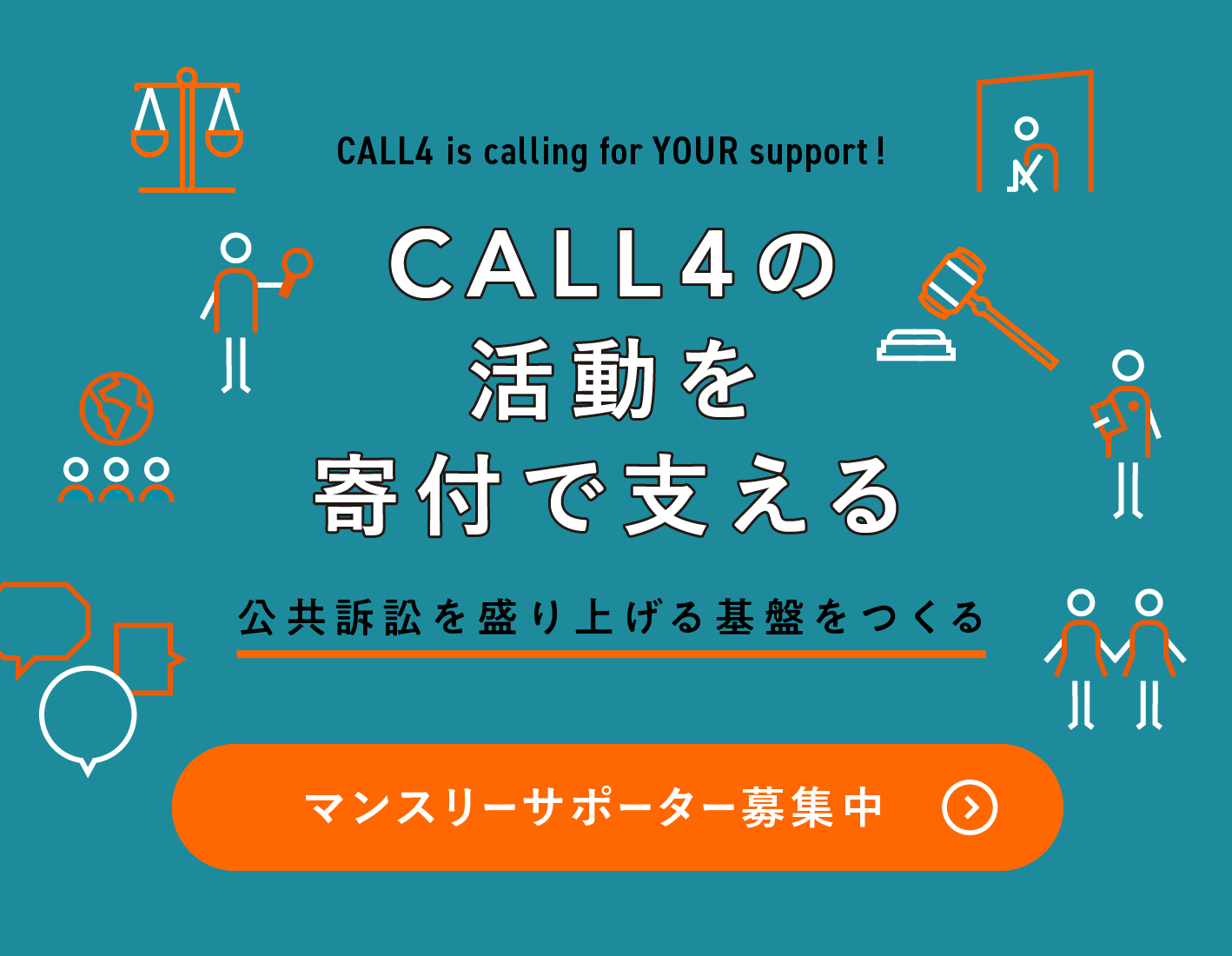「イチョウと住民自治を守ろう」訴訟 Lawsuit to Protect Ginkgo Trees and Local Citizen Autonomy
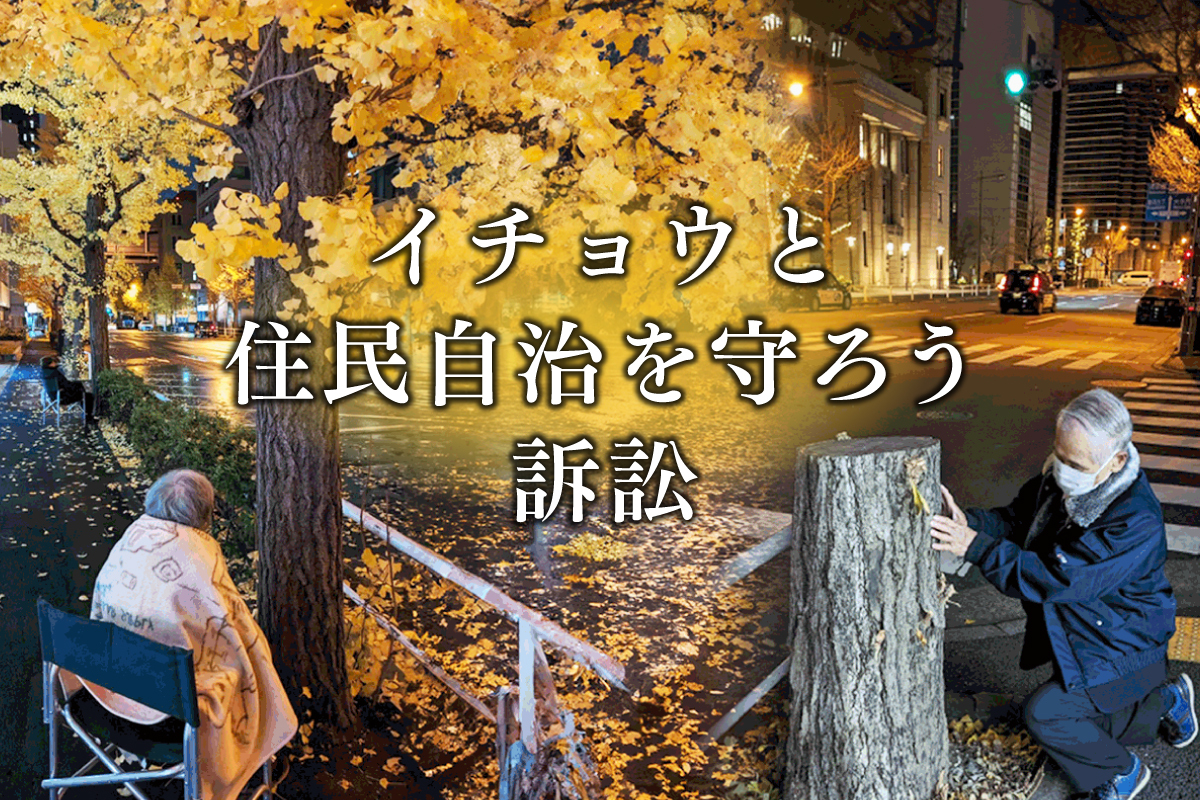
文教の街、神田で、古くから人々に親しまれてきた街路樹が、住民たちに対する十分な説明もないまま、伐採され始めています。千代田区は、住民との対話を拒絶したまま、強硬に計画を推し進め、反対する住民たちを排除しようとしています。イチョウ並木と、住民自治の原則を守るため、住民たちは伐採が行われないよう毎夜木の見守りを行いながら、司法にも救済を求めています。 In Kanda, a town of culture and education in Chiyoda City, Tokyo, the municipal government has begun cutting down the beloved roadside ginkgo trees without sufficient explanation to the residents. Chiyoda City is pushing forward with their plans, continuing to refuse dialogue with the residents and attempting to exclude those who oppose them. To protect the roadside ginkgo trees and uphold the principle of local citizen autonomy, the residents are seeking judicial redress in addition to organizing sit-ins around the trees every night to prevent the municipal government from cutting them down.
はじめに
イチョウの街路樹を守りたい。ここは文教の街、神田の顔の一つである神田警察通り。150本余ものイチョウの街路樹が並び、古くから住民たちが親しんできました。そんな神田警察通りの街路樹について、千代田区は突然、広く区民に知らせないままに伐採し、わざわざ桜に植え替える計画を立て、強硬に計画を推し進めています。私たち住民は行政に話し合いを求め続けていますが、区は一切応じようとしません。そのため、行政が伐採を強行することのないよう、毎夜工事時間に木に寄り添い、「木守り」の活動を行っています。
自然環境のみならず、計画の決議過程に法的な問題があることから、地方公共団体の施策は住民の意思が尊重されていなければいけないという住民自治の原則を守るべく、住民が原告となって、千代田区に対し、住民訴訟を提起しました。
*本ページ下部に時系列表があります。
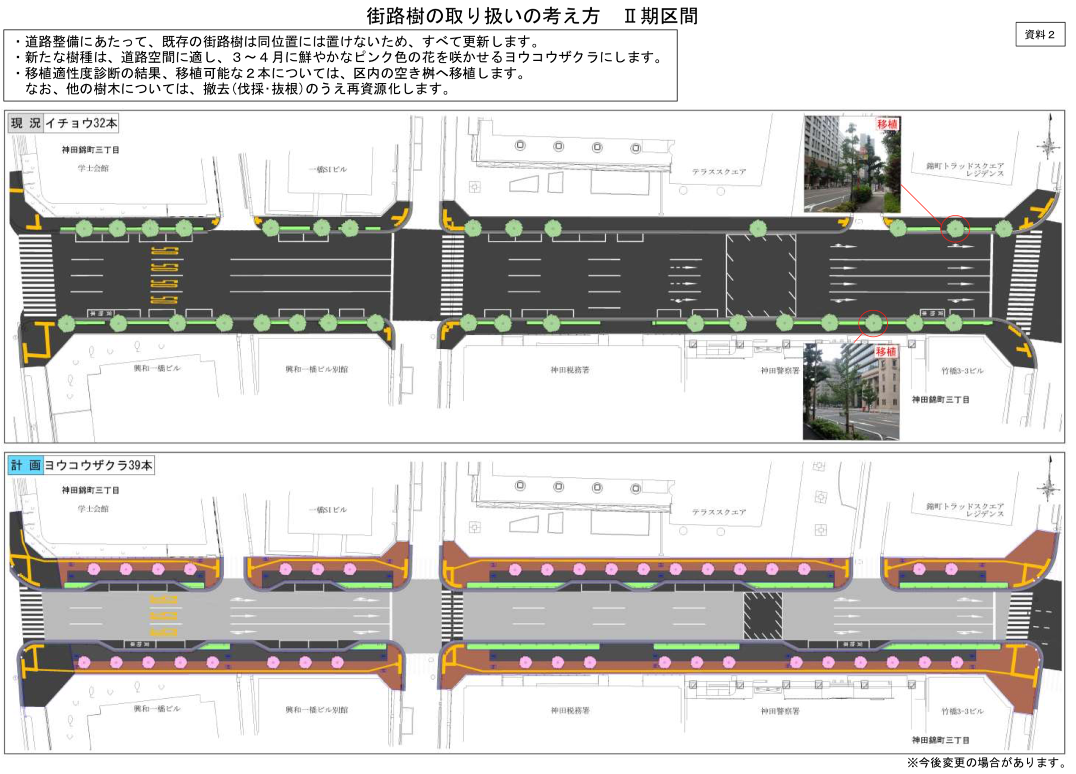
*千代田区ホームページ「神田警察通り沿道地域のまちづくり」資料「街路樹の取り扱いの考え方 Ⅱ期区間」より
これまでの経緯
神田警察通りの最初の工事区間である一期区間では32本の百年イチョウの大木を残したまま道路整備が行われました。ところが2020年、区は、自転車道を作るために残り区間の街路樹約150本を伐採するとの方針を決定しました。
そして、2021年には区議会において現在伐採が問題となっている二期区間の工事契約が議決され、区は伐採方針を区民に広く知らせることなく、工事請負契約を締結しました。住民は木に貼り付けられた「死刑宣告」とも言える伐採通知をもって、二期区間のイチョウ32本が伐採(うち2本は移植)されることを知りました。
その後、幾度となく話し合いを求め、陳情や署名を提出してきましたが、区は「既に議決されたこと」として、一向に話し合いの姿勢を見せません。
議決前に行われた、近隣住民を対象とする神田警察通りの整備に係るアンケートでは、既存の街路樹の伐採肯定へ誘導するような設問がありました。また、学識経験者への意見聴取では、専門家の意見が本人の確認を経ないまま異なる要約をされて、伐採に賛成する意見のように記載されていました。いずれも都合の良いように事実を恣意的に歪曲し、区議会に対して虚偽の報告を行っていました。
このような対応では住民の意思を適切に反映させることはできません。実際に、一昨年7月に提出した署名では、推進派133名、反対派604名の署名が集まっており、反対する住民の声は無視できないものであるはずです。
私たちは話し合いを求めて、裁判と並行して毎夜の木守りを続けています。
| 神田警察通り 道路整備工事対象区間 | |
|---|---|
| 一期 | 共立講堂横、雉子橋通りから白山通りまでの約220m |
| 二期 | 学士会館横、白山通りから千代田通りまでの約230m |
| 三期~五期 | 千代田通り以東、神田駅までの約910m |
事案の概要
概要
本訴訟は、神田警察通り二期工期の街路樹伐採を止めるための住民訴訟です。
神田警察通りは約1.36kmにわたって神田地区を東西につなぐ通りです。現在問題となっている約230mにわたる工事区間では、車線を減らしての歩道の拡幅と自転車道の新設が計画されています。当初の「神田警察通り沿道賑わいガイドライン」では、既存の街路樹であるイチョウを保存した上で一期工期と同様に整備されることになっていました。しかし、区は、いつの間にか32本のイチョウを伐採(うち2本は移植)する請負工事契約を締結し、これまでに32本中7本のイチョウの伐採を強行しました。原告をはじめとする私たち住民は、道路整備には反対しておらず、街路樹を伐採せずに工事が完了した隣の一期区間と同じように、イチョウを残して歩道拡幅するように求めています。
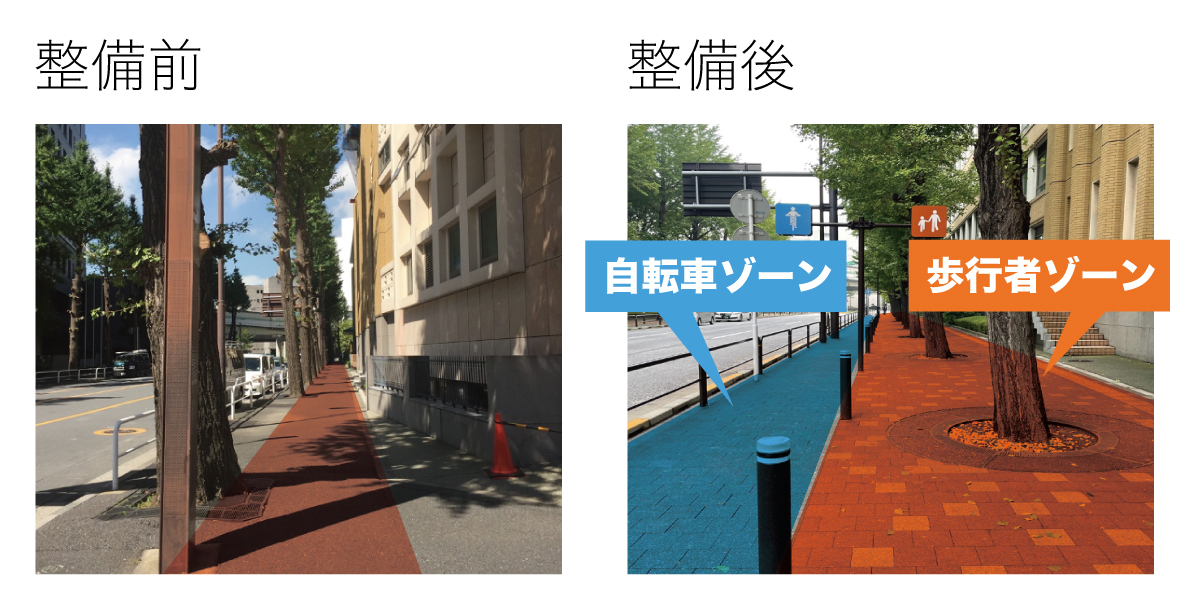
▲イチョウを残したまま工事完了した一期工事区間の様子
契約締結時の瑕疵
請負工事契約締結に際して、区は、
①街路樹の伐採をしないと歩道拡幅ができない
②10年にわたって地域と協議を行い、その中で大方、全員一致と言っていいほどの共通理解が図られている
③対話の下で進めたい
と区議会で答弁しました。しかし、下記図1のとおり、隣の一期工事区間と同様に、当初のガイドラインのとおり街路樹を保存したままの歩道拡幅は可能です(①)。さらに、当時伐採に関して住民の合意形成の機会は開かれておらず、その後も反対する住民と千代田区側の対話の機会は一度しか設けられませんでした。つまり、議会における区側の答弁はいずれも事実と反するものであり、区側も沿道に住む住民らと街路樹の伐採について議論を行っておらず、発言に誤りがあったことを認めています。
これらの事実は、前千代田区議の大串博康氏の意見書において詳細に記載されており、裁判所にも提出されています。当時請負工事契約を締結の前提となる議決をする際に、企画総務委会の委員(副委員長)でしたが、当時住民側との合意形成の有無が最大の争点であったにもかかわらず、千代田区側の説明には、上記の3点について事実と異なる説明があったことが書かれています。そして、当時の議決は、賛成5 名、反対3 名であったため、仮に正しい答弁と説明がなされれれば、大串前区議は反対していたことから、賛成4 名、反対4 名の同数となり、委員長採決に委ねられる事態になっていたはずです。住民の合意がとれていないこと、今後も対話による変更はないこと等がわかれば、少なくとも大串委員の反対により、賛成多数とはならなかったといえます。この状況下では、当日採決はなされなかった可能性が高く、上記虚偽答弁による議決手続上の瑕疵は重大であるといえます。この点については、幸田雅治神奈川大学法学部教授の意見書でも指摘がなされており、裁判所に証拠として提出されています(→「裁判の争点」)。
虚偽答弁による議決を認めれば、契約締結の適正が確保されず、結果として住民自治の理念にも反することとなります。虚偽答弁を前提とした議決は法の趣旨に反し無効であり、工事契約締結は違法になると考えられます。
また、同工事請負契約では、健全なイチョウを「枯損木」(枯れている木)と記載するなど多くの問題があり、本来は伐採の必要がないイチョウを伐採するために不要な経費を支出しているという点で、違法であると考えられます。
※図1
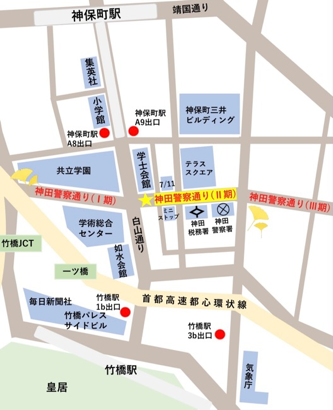
木守りと立入禁止仮処分の申立て
私たち住民は、街路樹の伐採を防ぐため、1年以上にわたって夜から明け方まで交代で木守りの活動をしています。その私たち住民に対し、区は2023年、区道への立入禁止仮処分の申立てを行いました。仮処分申立て後、区は、3日間にかけて警備員を動員し、1本を伐採、その後職員が住民を取り囲んで長時間執拗に撮影し続けるという行為に及んだため、その3日後に弁護団と住民で緊急記者会見を行い、その内容が報道されました。(2023年12月1日 朝日新聞記事)
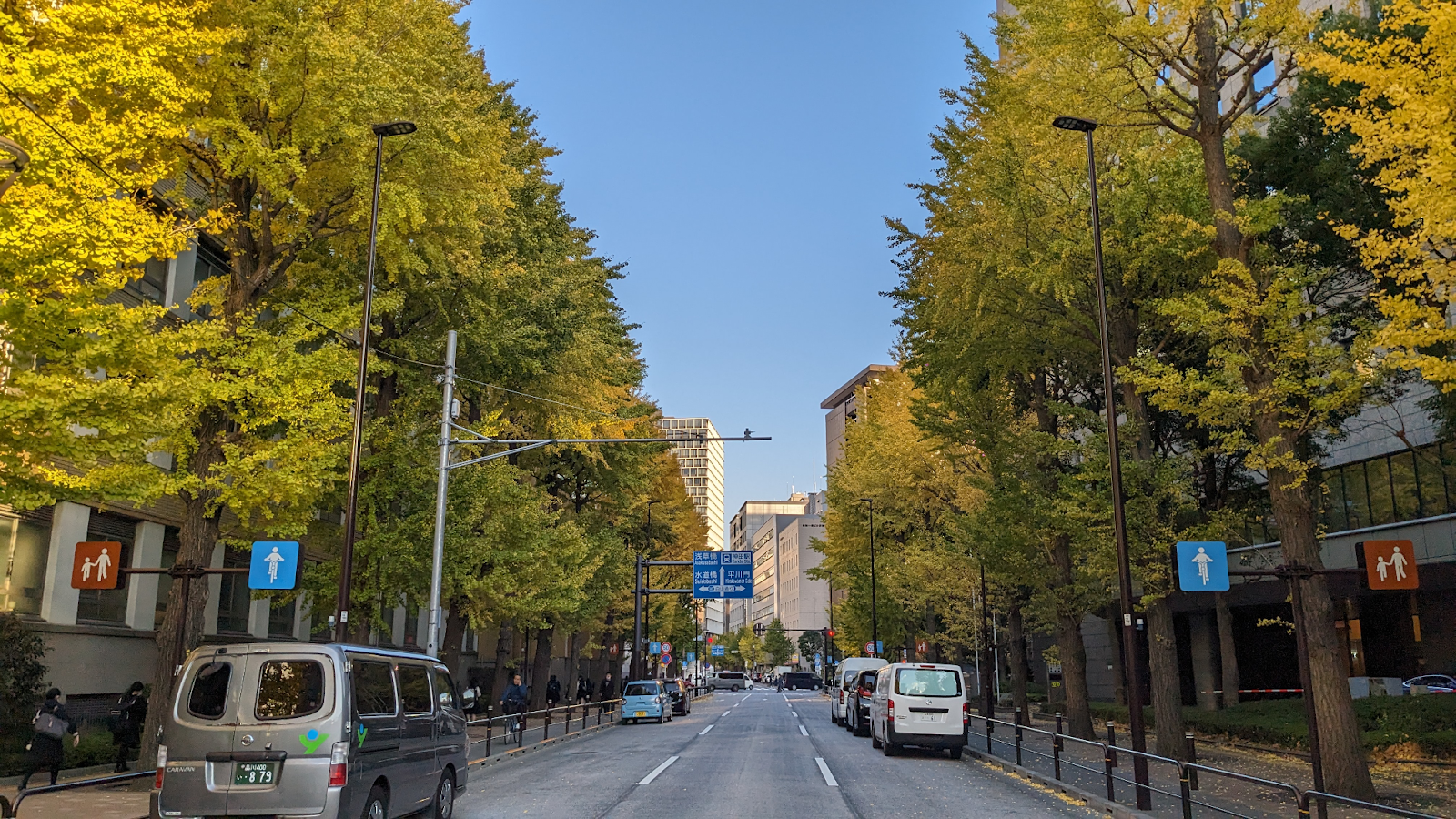
▲歩道拡張工事を経ても守られた一期区間のイチョウ並木
裁判の争点
1. 住民訴訟について
千代田区が街路樹を伐採する請負工事契約締結を承認した議決について、以下の点の違法性を訴えます。
①「神田警察通り沿道賑わいガイドライン」変更に必要な手続が取られなかったこと
②区議会で虚偽答弁が行われ、それに基づき千代田区議会において契約締結の決議がなされたこと
虚偽答弁の内容は「3 ・契約締結上の瑕疵」で述べた3点です。
私たち住民は、上記議決の違法性によって、当該議決が無効になると主張をしています。この点についての証拠として提出している幸田雅治神奈川大学法学部教授の意見書を提出しています。同意見書では、地方議会の議決が、「住民の意思に基づいて適正に行われることを期する」という民主主義の根幹をなす意味を持つものとされていることから、地方議会の質疑において虚偽の説明をしたり、正確な事実を伝えずに、あるいは事実と異なる説明をした中で行われた議決は、「住民の意思に基づいて適正に行われたもの」とは評価できず、虚偽説明があっても形式的に議決さえ得れば良いということが認められるとすれば、最高裁判決が言及する自治法の趣旨、目的を真っ向から否定することになるから、本件議決は無効であり、したがって、契約も無効とならざるを得ないと書かれています。
2.立入禁止仮処分について
路樹の伐採に反対する住民が、公道である神田警察通りに工事終了までの期間中立ち入ることができないという過度な制約の必要性
公道は、一般的に通行に供されるためにあるもので、終了時期が未定の工事終了までの期間中、当該区間に立ち入ることができないという仮処分の申立ては、住民の移動の自由のみならず、反対する住民の表現行為も制約するものであり、過剰な制約であると主張しました。
しかし、2024年3月10日に、東京地裁は、元々の千代田区側の申立ての内容からかなり限定した内容ではありますが、千代田区の恣意的な立入禁止の範囲の決定が可能な形で、住民らの立入禁止の仮処分を認める決定を出しました。私たち住民は、異議申立てを行う方針です。
社会的意義
都市において、街路樹は貴重な緑です。樹齢50年超のイチョウは、夏場の暑い日差しから守ってくれています。秋には黄金色に輝き楽しませてくれます。私たちは、次世代にこの貴重なイチョウを受け継いでいきたいと考えています。
また、昨今、神宮外苑や、日比谷公園などで街路樹の伐採が問題になっていますが、その背景には、道路や公園を整備して経済的利益に転化しようとする再開発の問題があります。千代田区では、神田警察通りの問題に限らず、住民合意がないまま強引に押し進める再開発の問題が多発しています。いずれも一部の人たちだけで決め、十分に情報が公開されないまま進められた計画で、住民自治の理念に反します。また、計画に反対する市民は「妨害者」であるとして、権力を行使して排除しようとする千代田区の姿勢は、権力の横暴さを如実に表しています。「地方自治は民主主義の学校」という言葉があるように、私たちに最も身近な行政庁である自治体が、このように住民を排除して街そのもののあり方を変えてしまう事態は許されてはなりません。全国どの自治体でも共通する問題です。
資金の使途
- 弁護士費用
- 意見書費用
- 宣伝、広告費用
- 事務局費用等
原告の思い
私たちは区に対し、話し合いを求め続けてきました。しかし、区長をはじめ区の職員や一部の区議会議員からは「議決されたことだから今さら何も変えられない」と一切取り合ってもらえません。この伐採計画は、ごく一部の地元住民とディベロッパーのみが参画した、多様性に乏しい協議会の中で一方的に決められたことです。私たち住民が伐採計画を知らされたのは議決後であり、反対する機会すら与えられなかったのです。
今回のような区の不当な手続きが看過されれば、区は住民の合意なしに何でも推し進めて良いことになります。私たちは長年親しんできたイチョウの木はもちろん、住民を疎外したまちづくりによって破壊されつつある自分たちの故郷を守るべく、戦い続けています。
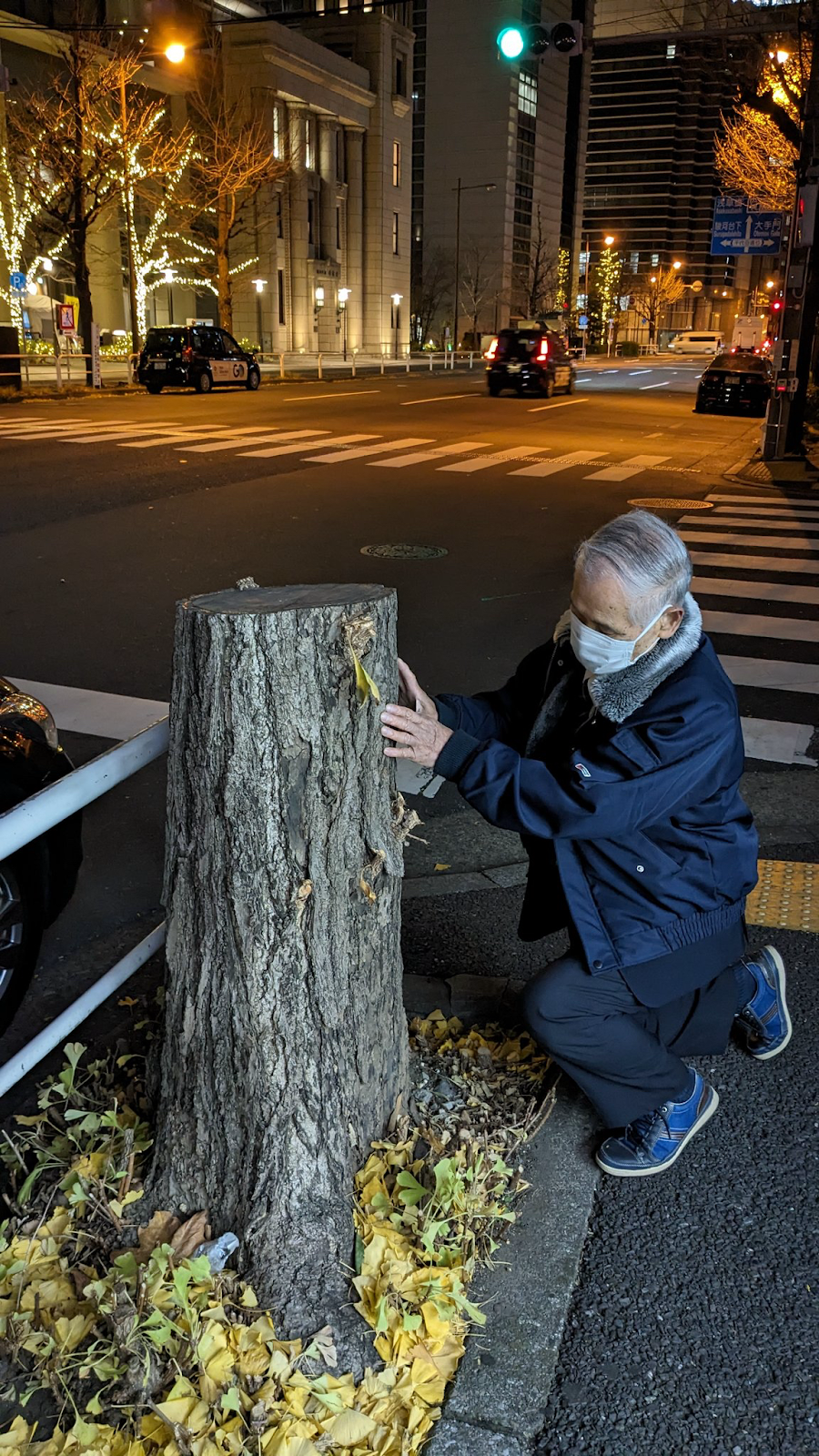
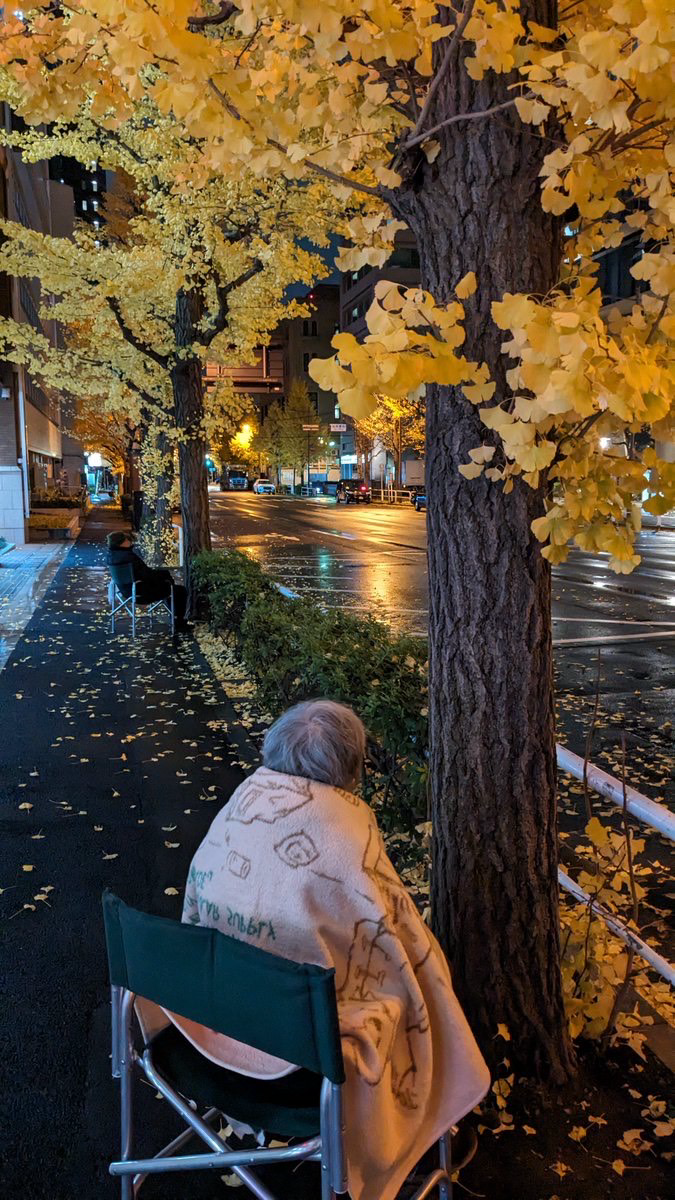
▲木守りの様子
担当弁護士のメッセージ
毎夜、イチョウが伐採されないように寄り添う人たち。それでも伐採を強行しようとする千代田区。反対する住民を警備員の増員や立ち入り禁止の仮処分を申立てによって排除しようとし、住民との話し合いを拒否して、決めたことだからと突き進んでいます。
今の千代田区には、むき出しの権力の恐ろしさを感じます。これは民主主義の危機です。権力の暴走を止めるために司法の責任はとても重いと考え、取り組んでいます。
担当弁護士の紹介
大城 聡 東京千代田法律事務所
福田 隆之 片岡総合法律事務所
熊澤 美帆 東京千代田法律事務所
久道 瑛未 早稲田リーガルコモンズ法律事務所
ご寄付のお願い
神田警察通りは、神宮外苑のように大規模でも有名でもない場所です。しかし、地域の施策を決めるのに、住民の意思を蔑ろにする、地方議会の議決を、虚偽の説明によって成立させる、自治体側の意に反する住民は排除するという状況がまかりとおることは、日本全国の自治体の住民自治のあり方にも波及する問題であると考えています。
小さな区間で起こっていることでも、日本の中心・千代田区で起きていることです。多くの方にこの問題に関心をもっていただき、ともに住民自治を取り戻すために闘っていければと思っています。
| これまでの主要な出来事 | |
|---|---|
| 2013年 | 「神田警察通り沿道賑わいガイドライン」策定 |
| 2018年 | 一期区間(共立女子前)の道路整備がイチョウを残したまま完了 |
| 2019年12月 | 区が神田警察通り道路整備についてのアンケートを実施(配布数4,704, 回答率14.5%) |
| 2020年12月 | 区は伐採方針を決定 (この時点でまだ住民は知らない) |
| 2021年9月 | 区がイチョウ伐採を含む工事契約を議決、大林道路との工事請負契約締結 |
| 2021年11月 | イチョウが伐採されることを多くの地域住民が知る |
| 2021年12月/2022年1月 | 住民が主体となって説明会を開催し、区職員を呼んで説明を求める |
| 2022年1月/3月 | 第19,20回の沿道整備推進協議会に初めて住民が参加 |
| 2022年4月9日 | 伐採推進派(町会)と反対派住民数名で話し合いの場が設けられるも、推進派が「これ以上の話し合いは平行線である」として一方的に話し合いを打ち切る |
| 2022年4月21日 | 住民20名が住民監査請求(→6月17日に棄却)…① |
| 2022年4月25日 | 企画総務委員会における陳情に関する審議で4:4となったが、最後は嶋崎委員長採択となり、委員長が否決したため全ての陳情がまとめて棄却される その日中に区は工事着手、住民は座り込み(木守り)を開始 |
| 2022年4月27日未明 | 区の夜襲により2本のイチョウが伐採される |
| 2022年5月15日 | 住民1名が住民監査請求(→2022年7月14日に棄却)…② |
| 2022年6月30日〜7月6日 | 区が舗装版切断工および試掘工を実施 |
| 2022年7月7日 | 区は雨水桝設置を試みるも、イチョウ保存/伐採によって設置箇所が異なるため、現段階で行うべきではないとの住民からの反対意見によって工事できず、撤収 今後説明会を開催すること、工事前には守る会代表に必ず連絡する旨約束を取り交わす |
| 2022年7月8日〜 | 「説明会の資料が作成できるまで工事はできない」との連絡を受け、木守りを中断 |
| 2022年7月11日 | ① の棄却を受け、住民10名が区を提訴 |
| 2022年8月8日 | ② の棄却を受け、住民1名が区を提訴 (①の訴訟と合同訴訟となる) |
| 2023年2月6日未明 | 突如、区が新たに4本のイチョウを伐採(住民には何の連絡も無し) 住民はその晩から木守りを再開 |
| 2023年4月11日 | 木守りをする住民が明け方3時に帰宅した後、区は4時に20名の警備員を含む計50名で再び夜襲を仕掛ける 気づいた住民が駆けつけ小競り合いとなるが、結局伐採はせず撤収 |
| 2023年11月15日 | 区が毎晩木守りをする住民に対し、二期区間への立ち入りを禁ずる仮処分を申請 |
| 2023年11月28日 | 区が住民の隙を狙い、新たに1本伐採 |
| 2023年11月29日〜30日 | 住民が木守りをしていたところ、区が再び伐採に来るも、伐採できず撤収 |
*Translated by Google translate
Introduction
I want to protect ginkgo street trees. This is Kanda Police Street, one of the faces of Kanda, a city of education and education. Over 150 ginkgo trees line the streets, and residents have loved them since ancient times. Chiyoda Ward suddenly decided to cut down the trees along Kanda Police Street without informing the residents of the area, and then went out of their way to replace them with cherry blossoms. We, the residents, continue to ask the government for discussion, but the ward has not responded at all. Therefore, in order to prevent the government from forcibly removing the trees, we carry out ``tree protection'' activities by standing next to the trees every night during construction hours.
Because there are legal issues not only with the natural environment but also with the planning process, residents became plaintiffs in order to protect the principle of resident autonomy, which states that local government policies must respect the will of residents. Therefore, a resident lawsuit was filed against Chiyoda Ward.
*There is a chronological table at the bottom of this page.

*From the Chiyoda Ward website “Kanda Police Street Roadside Area Urban Development” material “Considerations on Handling Street Trees Phase II Section”
The story so far
In the first phase, the first construction section of Kanda Police Street, the road was constructed while leaving 32 large 100-year-old ginkgo trees in place. However, in 2020, the city decided to cut down approximately 150 street trees in the remaining section to create a bicycle path.
Then, in 2021, the ward assembly voted on a construction contract for the second phase section where logging is currently an issue, and the ward concluded the construction contract without widely informing residents of its logging policy. Residents learned from a ``death sentence'' logging notice pasted on the trees that 32 ginkgo trees in the second phase would be felled (two of which would be transplanted).
Since then, the ward has repeatedly requested discussion and submitted petitions and signatures, but the ward has not shown any interest in discussing the matter, stating that it has already been passed.
In a survey of nearby residents regarding the development of Kanda Police Street that was conducted prior to the resolution, there were questions that encouraged people to approve of cutting down existing street trees. Furthermore, in interviews with academic experts, the experts' opinions were summarized differently without being confirmed by the experts, and were written as if they were in favor of logging. In both cases, they arbitrarily distorted the facts and made false reports to the district council.
This kind of response cannot appropriately reflect the will of the residents. In fact, the petition submitted in July two years ago had 133 supporters and 604 opponents, so the voices of residents who oppose it cannot be ignored.
We are continuing to hold nightly tree vigils in parallel with the trial, seeking dialogue.
| Kanda Police Street Road maintenance work section | |
|---|---|
| 1st term | Next to Kyoritsu Auditorium, approximately 220m from Kikibashi Dori to Hakusan Dori. |
| Phase II | Next to the Academic Hall, about 230m from Hakusan Dori to Chiyoda Dori |
| 3rd to 5th period | Approximately 910m east of Chiyoda Street to Kanda Station |
Summary of the case
overview
This lawsuit is a resident lawsuit to stop the cutting of roadside trees during the second phase of construction on Kanda Police Street.
Kanda Police Street is a street that connects the Kanda district from east to west, spanning approximately 1.36 km. In the approximately 230-meter construction section currently in question, plans are to reduce the number of lanes, widen the sidewalk, and construct a new bicycle path. The original ``Kanda Police Street Roadside Bustiness Guidelines'' called for preserving the existing streetside trees, ginkgo trees, and maintaining the area in the same way as in the first phase. However, the ward concluded a construction contract to cut down 32 ginkgo trees (two of which were transplanted), and so far seven out of the 32 ginkgo trees have been cut down. We, the residents, including the plaintiffs, do not oppose the road construction, and just like the neighboring first-phase section, where construction was completed without cutting down street trees, we would like to leave the ginkgo trees and widen the sidewalk. I'm looking for it.
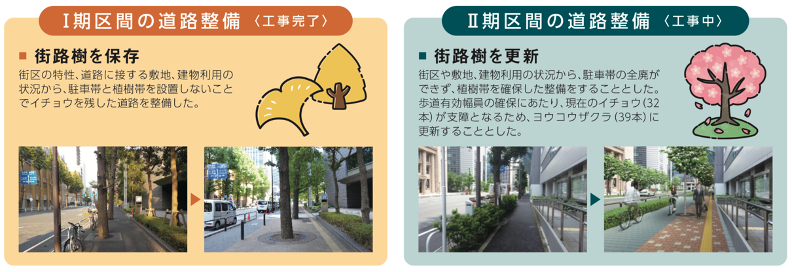
* From Chiyoda Ward Assembly Newsletter No. 260 (November 16, 2020)

▲The first phase construction section was completed while leaving the ginkgo trees intact.
Defects at the time of contract conclusion
When concluding a contract for construction work, the ward shall:
① It is not possible to widen the sidewalks without cutting down street trees. ② We have held discussions with the local community for 10 years, and a common understanding has been achieved that is almost unanimous. ③ We want to proceed through dialogue.
I answered this at the ward assembly. However, as shown in Figure 1 below, it is possible to widen the sidewalk while preserving the street trees as per the original guidelines, just as in the adjacent first phase construction section (①). Furthermore, there was no opportunity for residents to form a consensus regarding logging at that time, and even after that, there was only one opportunity for dialogue between residents who opposed the project and the Chiyoda Ward side. In other words, all of the ward's answers to the assembly are contrary to the facts, and the ward has not discussed cutting down street trees with residents living along the road, and has admitted that there were errors in its statements. .
These facts are detailed in a written opinion written by former Chiyoda Ward Councilor Hiroyasu Ogushi, which was also submitted to the court. At that time, he was a member (vice chair) of the Planning and General Affairs Committee when it came to making the decisions that were the prerequisite for concluding the construction contract, and even though the biggest issue at the time was whether or not there was a consensus with the residents. First, Chiyoda Ward's explanation states that the above three points were incorrect. The resolution at that time was 5 people in favor and 3 people against, so if the correct answers and explanations had been given, the former ward councilor Okushi would have been against it, so there would be an equal number of 4 people in favor and 4 people against. , the situation should have been left to a vote by the committee chairperson. If it is clear that there is no consensus among the residents and that there will be no changes through dialogue in the future, it can be said that at least due to the opposition of Commissioner Ogushi, there was no majority in favor. Under these circumstances, it is highly likely that no vote was taken on that day, and the flaw in the voting procedure caused by the above-mentioned false answers can be said to be serious. This point was also pointed out in a written opinion written by Masaharu Koda, a professor at Kanagawa University's Faculty of Law, which was submitted as evidence to the court (→ ``Issues at issue'').
If a resolution is allowed based on false answers, the appropriateness of the contract conclusion will not be ensured, and as a result, it will go against the philosophy of resident autonomy. A resolution based on false answers would be invalid and contrary to the spirit of the law, and the conclusion of a construction contract would be considered illegal.
In addition, there were many problems in the construction contract, such as the description of healthy ginkgo trees as "dead trees" (dead trees), and unnecessary expenses were incurred to cut down ginkgo trees that did not originally need to be cut down. As such, it is considered illegal.
*Figure 1

Petition for provisional disposition prohibiting tree protection and trespassing
For more than a year, we residents have been taking turns protecting trees from dawn until dawn to prevent street trees from being cut down. In 2023, the ward filed a petition for a provisional injunction against us residents, prohibiting us from entering the ward roads. After filing for a provisional injunction, the ward mobilized security guards to cut down one tree over a three-day period, and then surrounded residents and persistently filmed them for a long time. An emergency press conference was held with residents, and the contents were reported. ( Asahi Shimbun article December 1, 2023 )

▲Ginkgo trees in the first phase preserved even after sidewalk expansion work
Issues at trial
1. Regarding resident lawsuits
We are appealing the following points regarding the illegality of Chiyoda Ward's resolution approving the conclusion of a construction contract to cut down street trees.
① Necessary procedures were not taken to change the “Kanda Police Street Roadside Bustling Guidelines”
② A false answer was made at the ward assembly, and based on that, a resolution was passed at the Chiyoda ward assembly to conclude the contract.
The contents of the false answers are the three points mentioned in "3. Defects in concluding the contract."
We, the residents, argue that the above resolution is invalid due to its illegality. We have submitted a written opinion by Masaharu Koda, professor of law at Kanagawa University, as evidence on this point. The opinion document states that local assembly decisions are considered to be the basis of democracy, ``to ensure that decisions are carried out properly based on the will of the residents.'' Decisions made with false explanations, without accurate facts, or with explanations that differ from the facts cannot be evaluated as ``properly made based on the will of the residents.'' If it is accepted that even if there is a false explanation, it is sufficient to obtain a formal resolution, then the resolution in question is invalid because it directly negates the spirit and purpose of the Autonomy Act as referred to in the Supreme Court judgment. Therefore, it is written that the contract must also be invalidated.
2. Regarding provisional injunction prohibiting trespassing
The need for excessive restrictions such as preventing residents who oppose the cutting of roadside trees from entering Kanda Police Street, a public road, until the construction is completed.
Public roads are for general use, and a petition for a provisional injunction stating that no one can enter the section until the completion of the construction work, which has an undetermined end date, is limited to residents' freedom of movement. They also argued that it was an excessive restriction, as it also restricted the expressive behavior of residents who opposed it.
However, on March 10, 2024, the Tokyo District Court decided that, although the content of Chiyoda Ward's original petition was quite limited, it was possible to determine the scope of Chiyoda Ward's arbitrary trespassing ban. issued a decision approving a provisional injunction prohibiting residents from entering. We, the residents, plan to file an objection.
social significance
Street trees are a valuable source of greenery in cities. The ginkgo tree, which is over 50 years old, protects us from the hot summer sun. In autumn, it shines golden and is a delight. We would like to pass on this precious ginkgo tree to the next generation.
Furthermore, recently, cutting down of roadside trees has become a problem in areas such as Jingu Gaien and Hibiya Park, but behind this is the problem of redevelopment, which aims to improve roads and parks and turn them into economic profits. . In Chiyoda Ward, there are many redevelopment issues that are being forcibly pushed forward without residents' consent, not just the Kanda Police Street issue. All of these plans were decided by only a few people and proceeded without sufficient information being made public, and they go against the idea of resident autonomy. In addition, Chiyoda Ward's stance of using its power to eliminate citizens who oppose the plan as ``obstructors'' clearly shows the tyranny of power. As the saying goes, ``Local autonomy is the school of democracy,'' and it is unacceptable for local governments, the administrative agencies closest to us, to exclude residents and change the nature of the city itself. It won't. This is a common problem in all local governments across the country.
Use of funds
- Attorney's fee
- Opinion fee
- Promotion, advertising costs
- Secretariat expenses etc.
Plaintiff's thoughts
We have continued to ask the district for discussion. However, the mayor, ward staff, and some members of the ward assembly have not taken any action, saying, ``It's already been voted on, so we can't change anything now.'' This logging plan was decided unilaterally by a less diverse council that included only a small number of local residents and the developer. We, the residents, were only informed of the logging plan after it had been voted on, and we were not even given the opportunity to object.
If the ward's unfair procedures like this one are overlooked, the ward will be able to proceed with whatever it wants without the consent of residents. We continue to fight to protect not only the ginkgo trees we have known for many years, but also our hometown, which is being destroyed by urban development that alienates residents.


▲The tree guard
Message from the lawyer in charge
Every night, people stand together to keep the ginkgo trees from being cut down. Chiyoda Ward still tries to force the felling. They are trying to get the opposing residents removed by increasing the number of security guards and applying for a provisional injunction banning them from entering the area, refusing to discuss it with the residents, and proceeding because it is their decision.
I feel the fear of naked power in Chiyoda Ward today. This is a crisis of democracy. I believe that the judiciary has a very heavy responsibility in order to stop the runaway of power, and I am working on it.
Introduction of the lawyer in charge
Satoshi Oshiro Tokyo Chiyoda Law Office
Takayuki Fukuda Kataoka Sogo Law Office
Miho Kumazawa Tokyo Chiyoda Law Office
Emi Hisamichi Waseda Legal Commons Law Office
Request for donations
Kanda Police Street is not as big or famous as Jingu Gaien. However, it is common throughout Japan that local policies are decided by disregarding the will of residents, passing resolutions at local assemblies based on false explanations, and excluding residents who go against the wishes of local governments. We believe that this is an issue that will have ripple effects on the state of resident self-governance in local governments.
Even if it is happening in a small area, it is happening in Chiyoda Ward, the center of Japan. I hope that many people will take an interest in this issue and that we can fight together to restore residents' autonomy.
| Major events so far | |
|---|---|
| 2013 | “Kanda Police Street roadside bustle guidelines” formulated |
| 2018 | Road maintenance in the first phase section (Kyoritsu Joshi-mae) completed with ginkgo trees remaining. |
| December 2019 | The ward conducts a questionnaire regarding Kanda Police Street road maintenance (number distributed: 4,704, response rate 14.5%) |
| December 2020 | The ward has decided on a logging policy (residents do not know this yet) |
| September 2021 | Ward approves construction contract including ginkgo felling, concludes construction contract with Obayashi Road. |
| November 2021 | Many local residents know that ginkgo trees will be cut down. |
| December 2021/January 2022 | Residents take the lead in holding briefing sessions and calling ward officials to ask for explanations. |
| January/March 2022 | Residents participate for the first time in the 19th and 20th Roadside Improvement Promotion Council |
| April 9, 2022 | A forum was set up for discussion between the logging supporters (neighborhood association) and some residents who were against the logging, but the supporters unilaterally ended the discussion, saying, ``Further discussion is on a parallel path.'' |
| April 21, 2022 | 20 residents requested a resident audit (→rejected on June 17th)... ① |
| April 25, 2022 | The vote was 4:4 in the planning and general affairs committee's deliberation regarding the petition, but in the end it was decided by Chairman Shimazaki, and all petitions were rejected as a result of the chairman's vote. During the day, the ward began construction and residents began a sit-in (tree protection). |
| Early morning, April 27, 2022 | Two ginkgo trees are cut down in a night raid by the ward. |
| May 15, 2022 | One resident requested a resident audit (→dismissed on July 14, 2022)... ② |
| June 30th - July 6th, 2022 | The ward conducts pavement slab cutting and trial excavation. |
| July 7, 2022 | The ward attempted to install rainwater catchments, but the work could not be completed due to opposition from residents who said that it should not be done at this stage, as the installation locations differ depending on whether ginkgo is being preserved or felled, and the project was removed. We exchanged a promise to hold a briefing session in the future and to be sure to contact the protection group representative before construction begins. |
| From July 8, 2022 | Tree protection work was suspended after being informed that construction work could not be carried out until materials for the briefing session were prepared. |
| July 11, 2022 | ① Ten residents sued the ward after the |
| August 8, 2022 | Following the rejection of ② , one resident filed a lawsuit against the ward (this will be a joint lawsuit with ①) |
| Early morning February 6, 2023 | Suddenly, the ward cut down four new ginkgo trees (with no notification to residents) Residents resumed tree protection that night. |
| April 11, 2023 | After the residents guarding the trees returned home at 3 a.m., the ward launched another night attack at 4 a.m. with a total of 50 people, including 20 security guards. Residents who noticed the tree rushed over and a skirmish ensued, but in the end the tree was evacuated without being cut down. |
| November 15, 2023 | The ward has applied for a provisional injunction to prohibit residents who guard the trees every night from entering the second phase area. |
| November 28, 2023 | The ward takes advantage of residents' vacancies and cuts down another tree. |
| November 29-30, 2023 | While residents were protecting the tree, the ward came to cut it down again, but they were unable to cut it down and had to withdraw. |
あなたにおすすめのケース Recommended case for you
- 外国にルーツを持つ人々 Immigrants/Refugees/Foreign residents in Japan
- ジェンダー・セクシュアリティ Gender/Sexuality
- 医療・福祉・障がい Healthcare/Welfare/Disability
- 働き方 Labor Rights
- 刑事司法 Criminal Justice
- 公正な手続 Procedural Justice
- 情報公開 Information Disclosure
- 政治参加・表現の自由 Democracy/Freedom of Expression
- 環境・災害 Environment/Natural Disasters
- 沖縄 Okinawa
- 個人情報・プライバシー Personal information/Privacy
- アーカイブ Archive
- 全てのケース ALL
